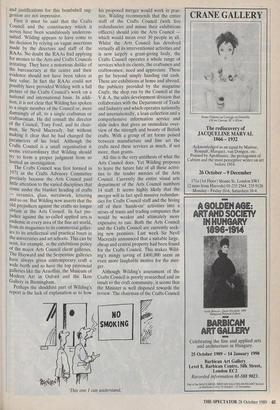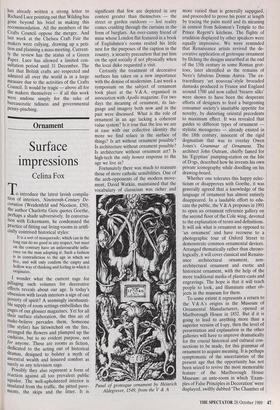Crafts
Mindless merger
Last week Supporting the Arts, a review of the structure of arts funding in this country, was presented by Richard Wilding (until lately head of the Office of Arts and Libraries) to the Minister for the Arts. Its purpose was to look at the complex, stormy relationship between the Arts Council of Great Britain and the Regional Arts Associations (RAAs). Wilding re- commends what he calls a federal approach in which the RAAs, reconstituted as Re- gional Arts Boards (RABs) would apparently work with the Arts Council as partners rather than as clients. So, more power and responsibility for the regions but also more accountability. So far, so boring.
Of course cuts and economies are in- volved. How could they not be in the present climate? Wilding proposes to re- duce the number of RAAs from 12 to seven RABs and also proposes sizeable cuts in staffing in both the regions and at the centre with the loss of over 100 jobs. He also looks ahead to a time when short-term contracts will replace the pre- sent Civil Service pay structure for Arts Council employees. He clearly wants the arts administrator's life to become a har- sher one, subject to continual reassessment and with no chance to — as he puts it 'gently mummify'. Mr Wilding has evident- ly mummified too long at the Office of Arts and Libraries, for despite his lucid man- darin prose at least one part of his report is shockingly under-researched and raises the question of the wisdom of entrusting a radical revision of this nature to an indi- vidual rather than to a working party. In the course of his investigation into the RAAs Wilding also looked at the two other bodies, aside from the Arts Council, which fund the regions. These are the Crafts Council and the British Film Insti- tute. Although an investigation of the Crafts Council was not part of his original brief, Wilding feels able to recommend that the Crafts Council lose its Royal Charter granted in 1982 and be merged with the Arts Council by 1991. His reasons
and justifications for this bombshell sug- gestion are not impressive.
First it must be said that the Crafts Council and the constituency which it serves have been scandalously unclercon- suited. Wilding appears to have come to his decision by relying on vague assertions made by the directors and staff of the RAAs. No doubt the RAAs find applying for monies to the Arts and Crafts Councils irritating. They have a notorious dislike of the bureaucracy at the centre and their evidence should not have been taken at face value. In fact the RAAs could not Possibly have provided Wilding with a full picture of the Crafts Council's work on a national and international basis. In addi- tion, it is not clear that Wilding has spoken to a single member of the Council or, most damningly of all, to a single craftsman or craftswoman. He did consult the director of the Council, Tony Ford, and its chair- man, Sir Nevil Macready, but without making it clear that he had changed the parameters of his brief. Although the Crafts Council is a small organisation it seems extraordinary that Wilding should try to form a proper judgment from so limited an investigation.
The Crafts Council was first formed in 1971 as the Crafts Advisory Committee precisely because the Arts Council paid little attention to the varied disciplines that come under the blanket heading of crafts — ceramics, glass, metalwork, lettering and so on. But Wilding now asserts that the old prejudices against the crafts no longer obtain at the Arts Council. In fact pre- judice against the so-called applied arts is endemic in every area of the fine art world, from its magazines to its commercial galler- ies to its intellectual and practical bases in the universities and art schools. This can be seen, for example, in the exhibitions policy of the major Arts Council client galleries. The Hayward and the Serpentine galleries have always given contemporary craft a Wide berth and so have the top provincial galleries like the Arnolfini, the Museum of Modern Art in Oxford and the Ikon Gallery in Birmingham. Perhaps the shoddiest part of Wilding's report is the lack of explanation as to how
his proposed merger would work in prac- tice. Wilding recommends that the entire staff of the Crafts Council (with five redundancies and minus their exhibitions officers) should join the Arts Council which would mean over 30 people in all. Whilst the Arts Council has devolved virtually all its interventionist activities and is now largely a grant-giving body, the Crafts Council operates a whole range of services which its clients, the craftsmen and craftswomen, need and appreciate. These go far beyond simply handing out cash. There are exhibitions at home and abroad, the publicity provided by the magazine Crafts, the shop run by the Council at the V & A, the sales development division that collaborates with the Department of Trade and Industry and which operates nationally and internationally, a loan collection and a comprehensive information service and slide index that gives an immediate over- view of the strength and beauty of British crafts. With a group of art forms poised between manufacture and fine art the crafts need these services as much, if not more, than grants.
All this is the very antithesis of what the Arts Council does. Yet Wilding proposes to leave the future fate of all these activi- ties to the tender mercies of the Arts Council. Currently the entire visual arts department of the Arts Council numbers 14 staff. It seems highly likely that the merger will in fact spell massive redundan- cies for Crafts Council staff and the hiving off of their 'hands-on' activities into a series of trusts and trading companies that would be weaker and ultimately more expensive to run. Both the Arts Council and the Crafts Council are currently seek- ing new premises. Last week Sir Nevil Macready announced that a suitable large, cheap and central property had been found for the Crafts Council. This makes Wild- ing's mingy saving of £400,000 seem an even more laughable motive for the mer- ger.
Although Wilding's assessment of the Crafts Council is poorly researched and an insult to the craft community, it seems that the Minister is well disposed towards the review. The chairman of the Crafts Council `This one I can understand.' has already written a strong letter to Richard Luce pointing out that Wilding has gone beyond his brief in making this recommendation. All the members of the Crafts Council oppose the merger. And last week at the Chelsea Craft Fair the makers were rallying, drawing up a peti- tion and planning a mass meeting. Current- ly the review has the status of a Green Paper. Luce has allowed a limited con- sultation period until 31 December. The fact that British crafts are respected and admired all over the world is in a large measure due to the activities of the Crafts Council. It would be tragic — above all for the makers themselves — if all this work were undone simply for the sake of bureaucratic tidiness and governmental penny-pinching.




































































 Previous page
Previous page